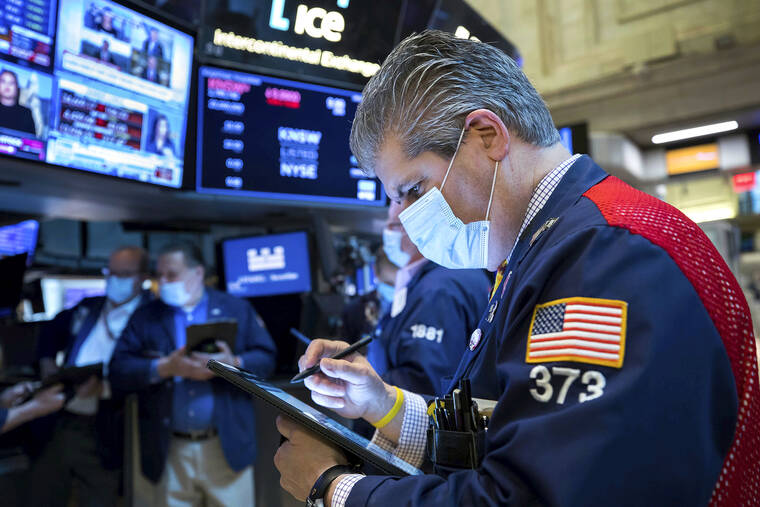Stocks fall, have worst week since March 2020; Netflix tanks
Stocks fell again on Wall Street Friday, capping off the worst weekly drop for the S&P 500 since the start of the pandemic.
Investors have grown increasingly worried about rising inflation and how aggressive the Federal Reserve might be in raising interest rates to tamp it down. Historically low rates helped support the broader market as the economy absorbed a sharp hit from the pandemic in 2020 and then recovered over the last two years.
ADVERTISING
The S&P 500 fell 84.79 points, or 1.9%, to 4,397.94. The benchmark index has now slipped three straight weeks to start the year. It fell 5.7% this week, its worst weekly decline since March of 2020 when the pandemic sent stocks into a bear market.
The Dow Jones Industrial Average fell 450.02 points, or 1.3%, to 34,265.37 and also fell for its third straight week.
The tech-heavy Nasdaq fell 385.10, or 2.7%, to 13,768.92. With investors expecting the Fed to begin raising rates as soon as its March policy meeting, shares in pricey tech companies and other expensive growth stocks have looked relatively less attractive. The index has fallen for four straight weeks and is now more than 10% below its most recent high, putting it in what Wall Street considers a market correction. The Nasdaq is down 14.3% from the record high set on Nov. 19.
“As always, once the volatility starts, investors pile on exacerbating the downward volatility,” said Nancy Tengler, CEO of Laffer Tengler Investments.
Technology and communications stocks were among the biggest drags on the market Friday. Streaming video service Netflix plunged 21.8% after it delivered another quarter of disappointing subscriber growth. Disney, which has also been trying to grow its subscriber base for its streaming service, fell 6.9%.
Treasury yields fell sharply as investors turned toward safer investments. The yield on the 10-year Treasury fell to 1.76% from 1.83% late Thursday. The drop weighed on bank stocks, which rely on higher yields to charge more lucrative interest on loans. Wells Fargo fell 2.4% and Bank of New York Mellon dropped 4.6%.
Inflation fears and concerns about the impact of higher interest rates have prompted a shift in the broader market after a solid year of gains in 2021. Technology stocks and consumer-focused companies have fallen out of favor. Energy is the only S&P 500 sector showing a gain; household good makers and utilities, which are typically considered less-risky investments, held up better than the rest of the market.
Supply chain problems and higher raw materials costs have prompted companies in a wide range of industries to raise prices on finished goods. Many of those companies have warned investors that their profit margins and operations continue feeling the pinch in 2022.
Rising costs have raised concerns that consumers will start to ease spending because of the persistent pressure on their wallets. The government’s retail sales data for December showed an unexpected decline in spending.
The Fed is now expected to raise interest rates earlier and more often than it had previously signaled in order to fight rising inflation that threatens to derail a further economic recovery. The Fed’s benchmark short-term interest rate is currently in a range of 0% to 0.25%. Investors now see a nearly 70% chance that the Fed will raise the rate by at least one percentage point by the end of the year, according to CME Group’s Fed Watch tool.
“The market is working through digestion of how much monetary policy change will occur over the course of 2022,” said Bill Northey, senior investment director at U.S. Bank Wealth Management.
Investors will be watching the closely when Fed officials meet for their latest policy meeting next week. Some economists are concerned the central bank has been to slow to act to fight inflation.


